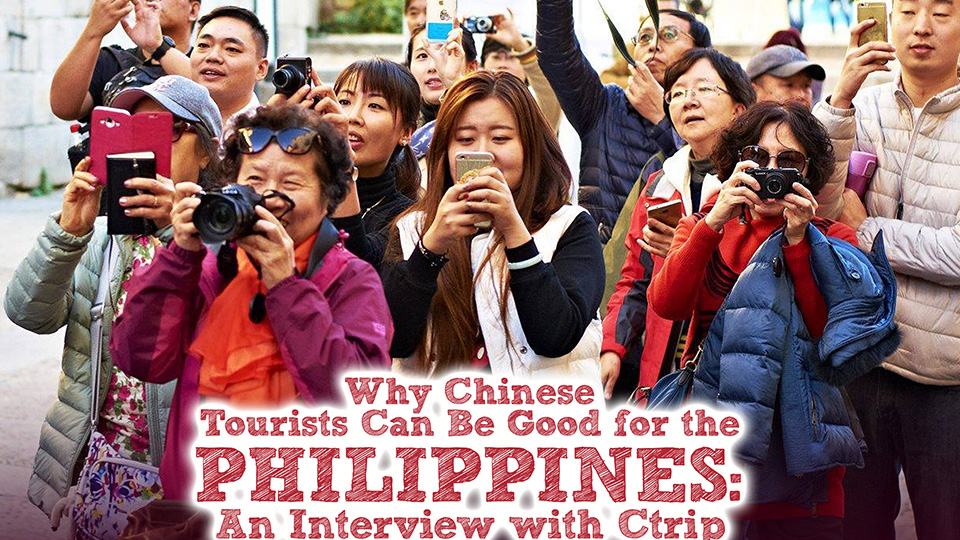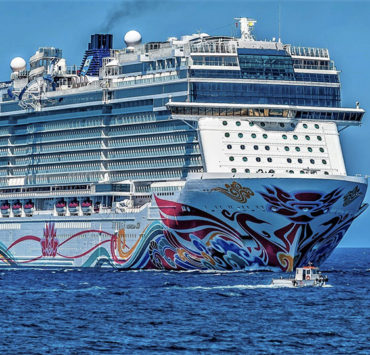Industry Talks: Ctrip & Why Chinese Tourists Can Be Good for the Philippines

CTrip’s Jerome Dela Cruz, Regional Director for Ctrip Philippines, talks to MY RANGGO about Ctrip. And the rapid growth of Chinese Tourism in the Philippines.
Ctrip has provided travel services, such as accommodation reservation, transport, packaged tours and corporate travel management since 1999.
Ctrip is currently the largest online travel agency in China.
MY RANGGO: Please introduce yourself and give us some details on your background and your designation?
Jerome: First and foremost thank you “RANGGO” for this interview, we appreciate this opportunity. My name is Jerome Dela Cruz, I am a Filipino and I started Ctrip in the Philippines. Me and my team act as the middlemen for Chinese travelers who would like to visit Philippines and offer them the best of our country.
I worked for a European wholesaler for almost 3 years, with a head office in Singapore, then started working for Ctrip in 2016.
MY RANGGO: Are you able to speak Chinese?
Jerome: Yi Diandian (“a little” in Mandarin) though in Ctrip, almost everyone can speak in English.
MY RANGGO: Ok. Thank you for that introduction. What are the main demographics of your Ctrip guests? For example their social class or budget level?
Jerome: More than half of our business in terms of age bracket ranges from 30 to 40 years old.
MY RANGGO: Do you know what Class, like in terms of Class A or Class B?
Jerome: High percentage are Class A guests, the likes of travelers that stay in Bulgari Resort Bali, Marina Bay Sands, Park Hyatt.
MY RANGGO: But just because your guests favor 4 and 5 Star accommodation, that doesn’t mean that there are more wealthy people in China, right? It just means that the hotels here in the Philippines are affordable. Is that right? Or does that mean that Ctrip’s guests are also considered rich in China?
Jerome: Have you watched Kevin Kwan’s “Crazy Rich Asians” movie? Just to exaggerate a bit, those are the types of guests that we are bringing into the Philippines. We cater to FITs (Frequent Individual Travelers); travelers that have been to different parts of the world, who are internet savvy and have decided to visit Philippines.
MY RANGGO: Do you include cultural orientation for your guests? Are they aware of the social Do’s and Dont’s before their tour starts?
Jerome: Since our guests are FITs who have been to Europe, America etc and are considered well-travelled, they research the Do’s and Don’ts in advance by themselves.
MY RANGGO: That is probably different to how many people view Chinese travelers, rightly or wrongly; that there are a lot of well-traveled Chinese. Do you employ local guides? And do you offer language classes to the local guides?
Jerome: As of the moment, there is no need for us to hire one as our guests can go around the destinations on their own.
MY RANGGO: What steps do you take to ensure that your tours are offered at the locally set minimum rate at least?
Jerome: Currently our guests are on a “DIY” or Do-It-Yourself basis with their tours, for more flexibility and they can also easily customize this to fit their needs.
MY RANGGO: Do you just sell accommodation or tours as well?
Jerome: We promote hotels.
MY RANGGO: Does it mean that they will hopefully patronize the local businesses, rather than just book with Chinese-owned establishments?
Jerome: Exactly.
MY RANGGO: What do you think the misconceptions, or beliefs, are that people have about Chinese people? Good and bad.
Jerome: That they don’t behave well, noisy and they don’t spend. I think those are the misconceptions we currently have in the Philippines for the China market.
MY RANGGO: These have become common misconceptions about Chinese Guests. What does Ctrip do to break down these negative perceptions?
Jerome: This is where we help the hotels and the hospitality industry in the Philippines. As we cater to FITs, we bring a different type of Chinese guest; well-travelled, independent and spends more. The kind of guests that make sure to check out the nearest Louis Vuitton shops.
MY RANGGO: That’s a good demographic to break the negative stereotypes. What areas of the Philippines does Ctrip offer?
Jerome: Now we operate nationwide, Chinese go everywhere which is good for our tourism.
MY RANGGO: In the past, when China would issue a travel ban, the Philippines would face all these cancellations. Are you saying it’s now different; that people still travel?
Jerome: The impact on travel bans are directly on GITs (groups) and as Ctrip caters to FITs we are part of the segment that takes the most minimal impact.
MY RANGGO: Do you plan to expand you current locations?
Jerome: Because we’re covering the entire Philippines already, there’s no need for us to expand.
MY RANGGO: But Ctrip has expanded to Vietnam?
Jerome: Yes and not only in Vietnam, we have offices in Japan, Korea, Malaysia, Thailand, Singapore, Indonesia, Cambodia and are also expanding to long haul destinations as well. Recently, Ctrip acquired one of the world’s largest metasearch player “Skyscanner” for USD1.7 Billion. This company has strong traffic in Europe based in Edinburgh, and they have 60 million active users which significantly boost our exposure in the European market.
MY RANGGO: Wow! So Ctrip owns Skyscanner!
Jerome: Yes, this is part of our globalization objective.
MY RANGGO: What is your most popular tour package or destination?
Jerome: Chinese love to go to beach destinations like Boracay, Cebu and Bohol while business travelers still flock to Manila.
MY RANGGO: Do you know the number of Chinese tourist arrivals in the Philippines, for the past 2 years?
Jerome: In 2017 we welcomed around 968,000 Chinese visitors to Philippines, compared to 2016 when we only have around 670,00 visitors, I could say the numbers are healthy.
MY RANGGO: Do you have estimated arrival figures for 2019?
Jerome: According to DOT, as of July this year we received around 674,000 Chinese visitors which is a 40% growth compared to last year. The overall tourism performance growth is around 9.4%, which means the Chinese arrival is growing faster than our overall growth and the target for this year is to reach 1.5 million Chinese visitors. If I am not mistaken, target of next year is 2M.
MY RANGGO: What advice can you give to hotels that want to attract Chinese guests?
Jerome: Talk to Ctrip, our team is based in Ayala Makati and our main objective is to act as bridge between the hotels and China market. We have more than half of the overall market share in China.
Also, we have a program called “Chinese Preferred Hotel”. We have studied the most requested and preferred amenities, items and facilities that Chinese are looking when they shop for a hotel to book and these are the requirements:
• Electric Kettle inside the rooms
• Chinese Breakfast options
• Chinese Introduction (Welcome note in Chinese)
• Tea Bags
• Chinese Signs/Instructions in public areas
• Union Pay
• Mandarin Speaking staff
• Free Wi-Fi
Once a hotel has confirmed that the above items are available at their property, we will move forward in accrediting them, place a “Chinese preferred logo” on their account page in Ctrip and also will provide a certification that hotels/resorts can display in their lobby as a form of welcome as well for the Chinese travelers.
From experience, those properties who have pushed for these requirements have tripled the business that they receive from Ctrip.
MY RANGGO: Obviously, other industries can benefit from Chinese tourists, not just hotels or tours. Can you mention other industries that you think can benefit from the Chinese guests?
Jerome: Restaurants will benefit as these are tourists who would like to try local food and delicacies. Shopping malls will greatly benefit in fact Chinese tourists spent an average of USD762 per person for shopping alone when they go overseas. This is another opportunity for the Philippines to push for the implementation of mobile payments, such as Wechat pay and Alipay, as 63% of Chinese nationals prefer to do their payments via these payment gateways. This is according to Nielsen studies.
MY RANGGO: What does Ctrip do to compete with other travel agencies and tour companies? How do you get ahead of the game, and what’s makes you different from the rest?
Jerome: We invest heavily on Artificial Intelligence. Technology is the foundation. As an example, at some hotels in China there is no need for our guests to approach the Front Desk, as they can use Ctrip APP and their phone to control the AC prior to check in, unlock the door and order food in advance etc. Another example would be, during the recent incident in Las Vegas, just a few minutes after it was reported, we were able to locate all our guests in the area and they were offered the best available flight back to China the next day.
MY RANGGO: How can hotels sign up with Ctrip? And what are the advantages for hotels that are affiliated with Ctrip?
Jerome: They can go to our website via this this link, and leave their details.
MY RANGGO: Do you sign up any kind of hotel or do you have a criteria?
Jerome: We don’t have a criteria, everyone is welcome to partner with us.
MY RANGGO: And what are the advantages, for the hotels that are affiliated with Ctrip?
Jerome: We mean business and we are the largest Chinese agent that can offer massive coverage and exposure throughout China.
MY RANGGO: You have already given us a lot of insight, is there anything you’ve missed out? Do you have any more insights into the Chinese culture and tourism industry, that would be beneficial to Filipinos to know?
Jerome: If you want China market, that’s us. Other countries are taking advantage of the Chinese tourists already. In Europe, London for example you will see Chinese queuing up for branded bags during the normal season. In New York, when you ride a cab, Wechat pay is available for Chinese riders. Big countries are looking forward to and embracing this big opportunity and I see no reason why we wouldn’t.
MY RANGGO: Have any of your guests experienced any animosity from Filipinos, or racism?
Jerome: Philippines is a very loving nation, just like in any place in the world it is normal to have bad experiences sometimes when we travel but I am proud to be a Filipino; when you see a lost tourist in the streets, it is in our nature to help, with a heart.
MY RANGGO: Our very last question: The Chinese Cruise ships that have visited Boracay have not always been well received. The perception is that the cruise guest trash the beach; they come, they leave. What’s your take on that? Is it because it’s a different Chinese Tourism market?
Jerome: That’s not our market.
Ctrip.com International, Ltd. (known simply as Ctrip) is a Chinese company, founded in 1999. Ctrip provides travel services such as hotel reservations, transportation ticketing, packaged tours and corporate travel management. Ctrip is the largest Online Travel Agency (OTA) in China.
In December 2013, Ctrip acquired the American travel company Tours4fun.
In November 2016, Ctrip acquired the Scottish travel company Skyscanner
In November 2017, Ctrip acquired Trip.com a USt travel research website.
Ctrip also holds stakes in NASDAQ-listed Home Inns, BTC-Jianguo Hotels and Resorts, and the NASDAQ-listed China Lodging (owner of the Hanting brand).






